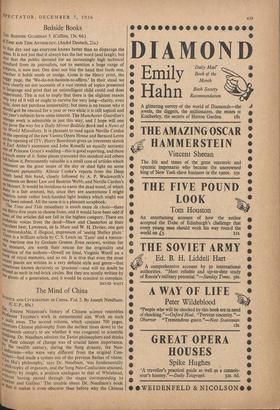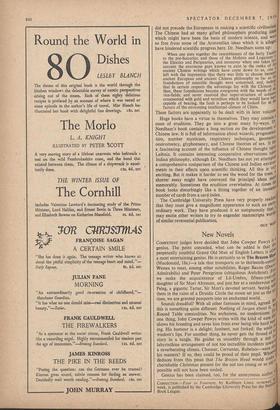The Mind of China
scfENCE AND CIVILISATION IN CHINA. Vol. 2. By Joseph Needham. (C.U.P., 80s.) AND CIVILISATION IN CHINA. Vol. 2. By Joseph Needham. (C.U.P., 80s.) JOSEPH NEEDHAM'S history of Chinese science resembles 4 professor Toynbee's work in monumental size. Work on such e scale awes. The second volume, which contains 700 pages, el‘,,aillines Chinese philosophy from the earliest times down to the th'enteenth century to see whether it was congenial to scientific th,111,king. Dr. Needham admires the Taoist philosophers and thinks h'i their concept of change was of crucial latent importance. eY the twelfth century, during the Sung dynasty, the Neo- fli°flfucians—who were very different from the original Con- .cekians—had made a system out of the previous flashes of vision. a "11 Hsi's philosophy,' says Dr. Needham, 'was fundamentally ) i?hiloso-p r of organism, and the Sung Neo-Confucians attained, primarily by insight, a position analagous to that of Whitehead, Na`"tit having passed through the stages corresponding to ia'vvton and Galileo.' The trouble about Dr. Needham's book
that it makes it even obscurer than before why the Chinese
SPECTATOR. DECEMBER 7, 1956 did not precede the Europeans in making a scientific civilisation. The Chinese had so many gifted philosophers producing ideas which might have been the basis of modern science, and were, so free from some of the Aristotelian ideas which it is alleged have hindered scientific progress here. Dr. Needham sums up: When one puts together the resemblances of the early Taoists to the pre-Socratics, and those of the Mohists and Logicians the Eleatics and Peripatetics, and moreover when, one takes tnto account the enormous gaps known to exist in the ranks of t''" ancient Chinese writings which have come down to' us, one 15 left with the impression that there was little to choose bets8e5) ancient European and ancient Chinese philosophy so far as till foundations of scientific thought were concerned, and, indecu.; that in certain respects the advantage lay with the Chinese. then, these foundations became, overgrown with the weeds of thl rice-fields, and never received that super-structure of colualos ornamented with gold and vermilion which they would have befil capable of bearing, the fault is perhaps to be looked for in 1° factors of the -environing intellectual climate of China.
These factors are apparently to be dealt with in later volumes' Huge books have a virtue in themselves. They may contain mass of erudition. They go into a great many by-ways. Pi Needham's book contains a long section on the development 0' Chinese law. It is full of information about wizards, prognostics' tion, number mysticism, respiratory techniques, geomar°: oneiromancy, glyphomancy, and Chinese theories of sex. It has a fascinating account of the influence of Chinese thought ata°,11 Leibniz. It contains interesting comparative observations ors°' Indian philosophy, although Dr. Needham has ,not yet attemPted a comprehensive comparison of the Chinese and Indian enviro5; 4 ments in their effects upon scientific thinking. All this is very exciting. But it makes it harder to see the wood for the trees. shorter essay might have conveyed the principal ideas 111°rt memorably. Sometimes the erudition overwhelms. At times St4 , book looks disturbingly like a fitting together of an imniers7 number of cards from a card index. The Cambridge University Press have very properly realtard that they must give a magnificent appearance to such an extra' ordinary work. They have produced it so sumptuously that lt may excite .other writers to try to engender manuscripts wort'„ of similar reverential publication. Guy WI°



































 Previous page
Previous page